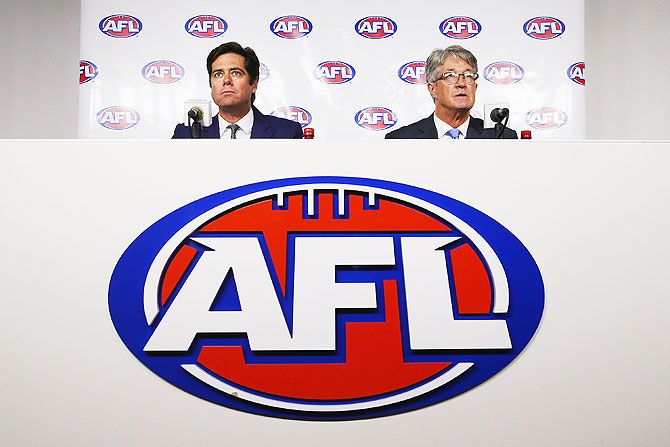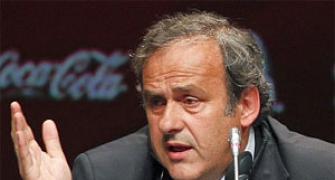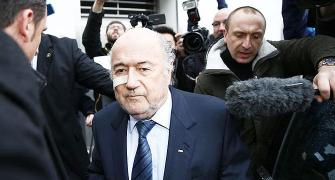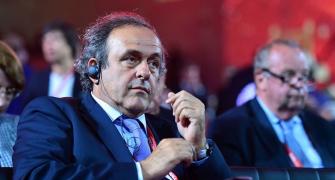
Thirty-four past and present players from Australian Rules team Essendon Bombers, one of the country's richest and most storied football clubs, were issued two-year bans for doping on Tuesday in a ruling that stunned the sports-mad nation.
The Court of Arbitration for Sport upheld an appeal brought by the World Anti-Doping Agency against a decision in March which cleared the players of taking a banned supplement during the Australian Football League's 2012 championship season.
"The 34 players concerned are sanctioned with a period of ineligibility of two years, commencing on 31 March 2015, with credit given for any individual period of ineligibility already served," CAS said in a statement.
"Thus, most of the suspensions will come to an end in November 2016."
The decision leaves Melbourne-based Essendon without 12 of their listed players and effectively hobbled for the entire 2016 season of AFL, a game supported religiously in the nation's southern states.
Five of the 34 play for four other clubs, with the remaining 17 no longer active in the 18-team top-flight.
Australia's biggest doping scandal in domestic sport, Essendon were heavily sanctioned by the AFL in 2013 after a joint investigation with the country's national anti-doping authority uncovered an organised and highly dubious regime of supplement injections given to players.
The club, whose local standing can be likened to the Green Bay Packers in American football, were fined A$2 million, kicked out of the 2013 playoffs and had their coach James Hird suspended for a year for bringing the game into disrepute.
But last March, the AFL's anti-doping tribunal found the players not guilty of taking Thymosin beta-4, a banned supplement believed to aid in tissue repair and regeneration, citing a lack of evidence.
The Australian Sports Anti-Doping Authority (ASADA) decided not to appeal the decision and handed the case over to WADA, a move that angered local pundits who accused the national body of trying to prolong a witch-hunt.
"This unfortunate episode has chronicled the most devastating self-inflicted injury by a sporting club in Australian history," ASADA boss Ben McDevitt said in a statement on Tuesday.
"The players had received anti-doping education through the AFL and ASADA, and were well aware that they are personally responsible for all substances that entered their body.
"Unfortunately, despite their education, they agreed to be injected with a number of substances they had little knowledge of, made no enquiries about the substance and kept the injections from their team doctor and ASADA."
FURIOUS PLAYERS
WADA applauded the decision, saying in a statement that it was 'justice' for clean athletes.
AFL CEO Gillon McLachlan said his body accepted the decision but was surprised by its severity.
He told reporters in Melbourne that Essendon would be afforded special concessions to recruit replacement players and "get through this extraordinarily difficult period."
He also confirmed that the Brownlow Medal won by Essendon captain Jobe Watson in 2012, the game's annual most valuable player award, would be reviewed.
The decision nonetheless ignited a fire-storm in mainstream and social media, with furious players and pundits condemning a process which started with the launch of the probe in early 2013 and overshadowed the game for three seasons.
Essendon chairman Lindsay Tanner told reporters the ruling was "manifestly unfair" for the players, but also apologised on behalf of the club for "serious mistakes" made in 2012.
"This is a miscarriage of justice for 34 young men,” former coach Hird said in a statement.
The AFL players association boss Paul Marsh said the league should consider splitting from WADA, a suggestion McLachlan quickly dismissed.
The Essendon probe was made public on February 5, 2013, two days after an explosive government report alleged widespread doping in the country's top sports leagues.
The report's release was dubbed the "blackest day in Australian sport".
The probe that followed also found wrongdoing in Australia's top-flight rugby league competition.
Last August, 12 Cronulla Sharks players in the National Rugby League accepted one-year suspensions from ASADA for taking proscribed supplements. Their bans were contentiously backdated to Nov. 2013, ensuring that most of them would only miss a handful of championship games.
Stephen Dank, a controversial sports scientist who worked with both Essendon and Cronulla, was banned for life by the AFL last year for his involvement in the supplements programme.











